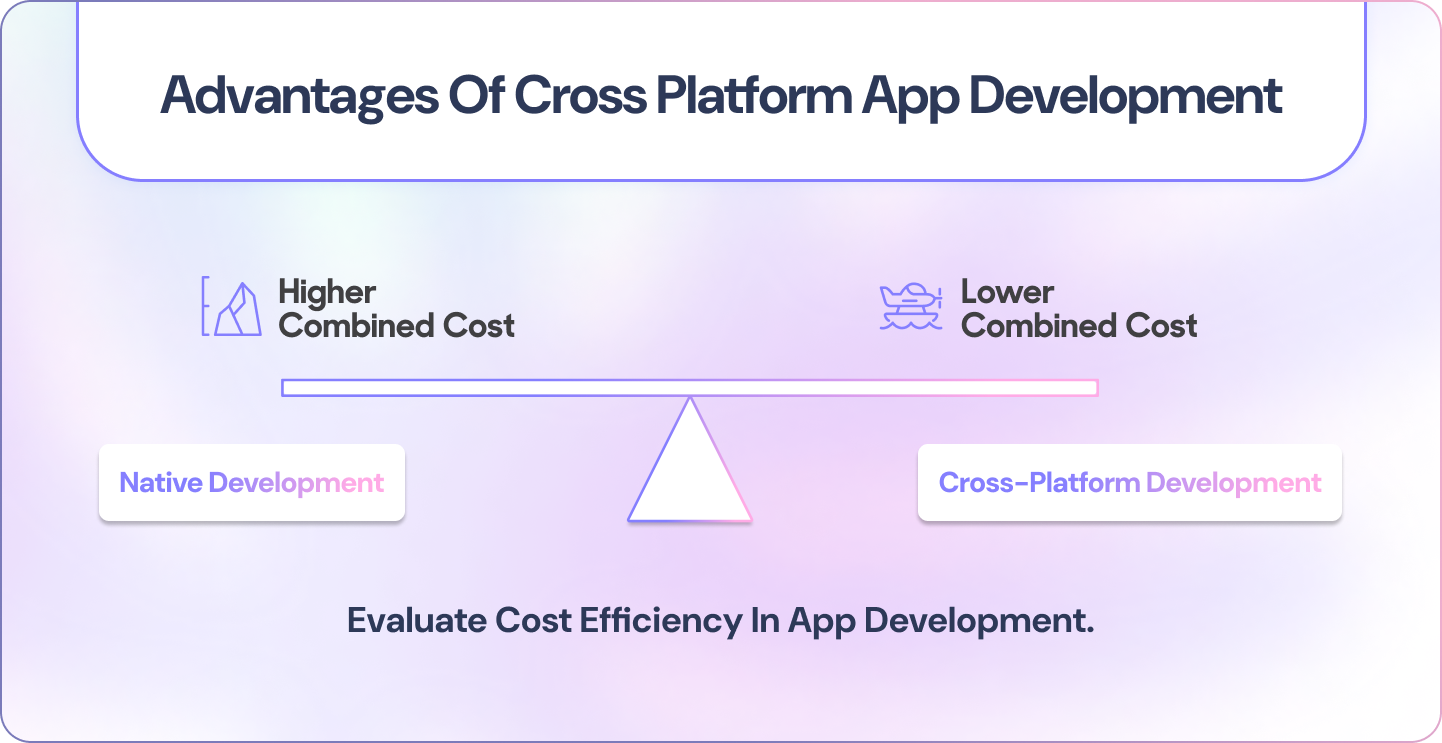Why Cross-Platform Development is the Smart Choice for Budget-Conscious Entrepreneurs
Time is money,” and if you’re missing out on this factor, you haven’t explored cross-platform development yet. Cross-platform development means building .Applications and programs that can be used on different platforms using a single code.
Big businesses like Amazon, Microsoft, and Meta all improve their efficiency by following cross-platform development as it
- Saves time
- Maintenance is easier
- Saves money
- Improves productivity.
In this fast-paced digital world, Cross-platform mobile application development has emerged as one of the leading technologies for business owners. Today, one-third of developers already use or plan to adopt cross-platform development.
These statistics prove that a solid presence on diverse mobile platforms is essential for small businesses to grow. Expanding a business’s growth, connecting with customers, driving growth – there’s so much cross-platform has to offer for every entrepreneurial journey.
Moreover, Cross-platform mobile application development behaves like a dabster in making business audiences targeted masterfully. It defines the outlook of the social market, economics, social circle, and more. Cross-platform development drives innovation and creativity and gives a competitive edge to a modern business. It offers a myriad of assistance that induces business in plentiful ways.

However, mobile applications can be pricey. Thus, developing digital products with a cross-platform approach comes with various benefits. The fame of cross-platform development is escalating day by day. It saves time by allowing you to launch your application fast without the need to release different Android, iOS, or web versions.
What is Cross-Platform Development?
Cross-platform development is to create software applications that can run seamlessly across multiple devices. This cross-platform strategy is widely popular amongst budget-conscious business owners.
This approach helps to save both time and cost, making it a popular choice amongst business owners. Its increasing fame has also opened new prospects for entrepreneurs who can now develop mobile applications beyond their budget. It helps accelerate the development process and lowers the expense as there is no requirement to maintain multiple versions of apps.
Thus, a cross-platform development approach is an asset for businesses of all sizes. Let’s dig in to know the factors and benefits of cross-platform development. There are numerous cons to cross-platform development, which is opted by companies all over the globe.
Key Factors to Consider Before Adopting Cross-Platform Development
We know how popular cross-platform app development is getting day by day. Thus, it is essential to consider the points below before adopting cross-platform mobile application development.
-
- <li
1. Business Goals:
- Choosing the right development approach is necessary for the business to launch their product. Thus, adopting a platform that aligns with your business goals is essential. So, conducting a thorough analysis of the market and audience is crucial.
- 2. Minimal access to native features :
Entrepreneurs should keep in mind that Cross-Platform development may have limited access to new features, and to cope with this, one may have to wait to use these features from open-source communities. - 3. Device compatibility:
We already know that various devices are available in the market. Thus, device compatibility is essential to ensure that your app works well on all devices, be it mobile phones, laptop, computers etc. - 4. Competitor Analysis:
Before adopting cross-platform app development, thorough research is always needed. Look at the strategies your competitors are using and make effective changes accordingly. If everything goes well for your competitor, it could also be viable for you.
Benefits of Cross-Platform Apps for Small Businesses
-
- 1. Worthwhile and Gainful:
One reason cross-platform development is trending is its cost. This approach uses a single codebase to create apps on multiple platforms, saving both cost and time. Cross-platform apps are thrifting tools that transform businesses like a quantum leap. In the meantime, native apps use separate codebases for iOS and Android.
As a consequence, this approach is ideal for budget-conscious business owners. Earlier approach was to make different applications for different operating systems like using Swift for iOS development and Kotlin for Android development. Using cross platform approach for development has solved this problem for the developers.
-
- 2. Faster Time To Market:
We already know how dynamic and ever-growing our market is! Thus, it’s a need of the hour to stay ahead of the competition by taking the required steps of the process. The cross-platform development approach lends a helping hand to get a wiggle on the development process and does not require writing code for separate platforms.
The speedy the approach, the quicker the business owner can grab the market. So, it is evident that a cross-platform approach benefits and aids business owners.
Since the development process only asks the code to be written once for different operating systems, the apps enter the market relatively quickly and feedbacks from the users help to improve the development further.
-
- 3. Streamlined Maintenance:
We already know that cross-platform applications use a single codebase, making them easy to maintain. Meanwhile, the native approach requires maintaining two separate codebases. Cross-platform apps help businesses implement changes across all platforms. Thus, the cross-platform approach makes maintenance manageable by enhancing the overall user experience.
-
- 4. Greater Market Reach:
The traditional approach uses a separate code base, which means they are available for only one group of users. Cross-platform approaches engage iOS and Android users, enabling you to connect with your audience.
Since developing different applications for different users takes more effort, businesses often cannot reach a broader user base. Moreover, inconsistencies appear during the development process, this problem is also solved by cross-platform development, which helps users get a wider user base.
- 5. Supporting Multiple Devices:
The market environment is very dynamic, and new devices are entering the market day by day. Thus, cross-platform applications make it easy to adapt to changes in the market. Cross platforms allow you to create and run an app wherever you want. Consistency is a factor that the user looks for in applications. Apps should perform consistently on all platforms like mobile apps, web-apps and websites. So, cross-platform is a wise choice to make your app accessible to everyone.
Top Cross-Platform Mobile App Development Frameworks
-
- 1. Flutter:
This is one of the most popular, and it was developed by Google in 2017.
It is an innovative, open-source framework to express creativity from a single codebase. It helps developers create high-quality mobile apps and websites using the Dart programming language. It’s just like you have to write once, and it will work anywhere; this makes this application a popular choice for cross-platform development. Its time and effort resisting application as it saves developers time and reduces efforts for creating apps and websites for specific code.
-
- 2. Ionic:
Ionic is one of the most successful and remarkable cross-platform applications based on angularJS. It allows developers to code in several languages, such as HTML, JavaScript, CSS, etc.
It is based on the SAAS UI framework, specially organized for mobile applications.
One of the massive benefits is that it uses Cordova plugins, which help to access device features like GPS, camera, and audio recording. The other thing that this developer’s priority is that this gives a native-like feel to the app, which looks great.
This framework is initiated by Facebook and is one of the most popular in building mobile apps. This framework is free and built on JavaScript, offering remarkable features. It is primarily known for mobile development but is also used to create web applications. Also, one of the reasons for this framework’s popularity is that React native apps can achieve near-native performance. This is because of native components and efficient rendering techniques.
-
- 4. Xamarin:
Xamarin cross-platform apps are usually different from others as it is a streamlined framework for developing Android, iOS, and Windows apps with c# and net assistance, excluding JS libraries and HTML. It gives a native-like app with xamarin, resulting in high hardware compatibility.
It reduces mobile apps’ time and cost as it works through class libraries. Xamarin directly supports Java, Objective C, and C++ libraries, which allow developers to copy any third-party code base, making it time-saving and one of the developers’ favorite frameworks.
- 5. Node.js
Node.js is one of the most fantastic frameworks for developing cross-platform apps. Node.js runs on various platforms (Windows, Linux, Unix, Mac OS X, etc. It is considered one of the best cross-platform mobile app development frameworks. It is known for its high performance and has revolutionized server-side development with its unique concurrency approach and focus on performance and scalability.
It is built on a V8 javascript engine and is used to create a robust backend. N in the MERN stack is for Nodejs, which is popularly used in real-time applications like video calls and online games, requiring a real-time stream server.
Wrapping It up!
So, it is clear from the above that choosing the best cross-platform mobile app development framework depends on various factors. Also, cross-platform development offers a compelling solution for businesses and developers seeking to reach an audience. Developers can create high-quality and user-friendly applications by leveraging the power of code reusability and embracing the available diverse tools and frameworks.
Also, it is essential to stay updated in the dynamic mobile development field, adapt to the strategies, and stay ahead in the competitive market.
TABLE OF CONTENT
- Why Cross-Platform Development is the Smart Choice for Budget-Conscious Entrepreneurs
- What is Cross-Platform Development?
- Key Factors to Consider Before Adopting Cross-Platform Development
- Benefits of Cross-Platform Apps for Small Businesses
- Top Cross-Platform Mobile App Development Frameworks
- Wrapping It Up!
